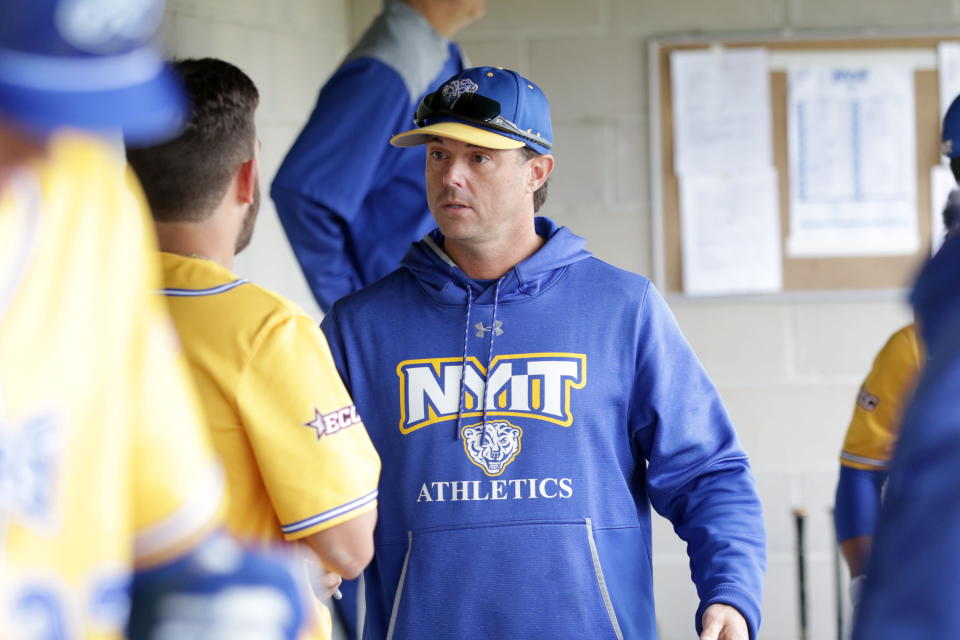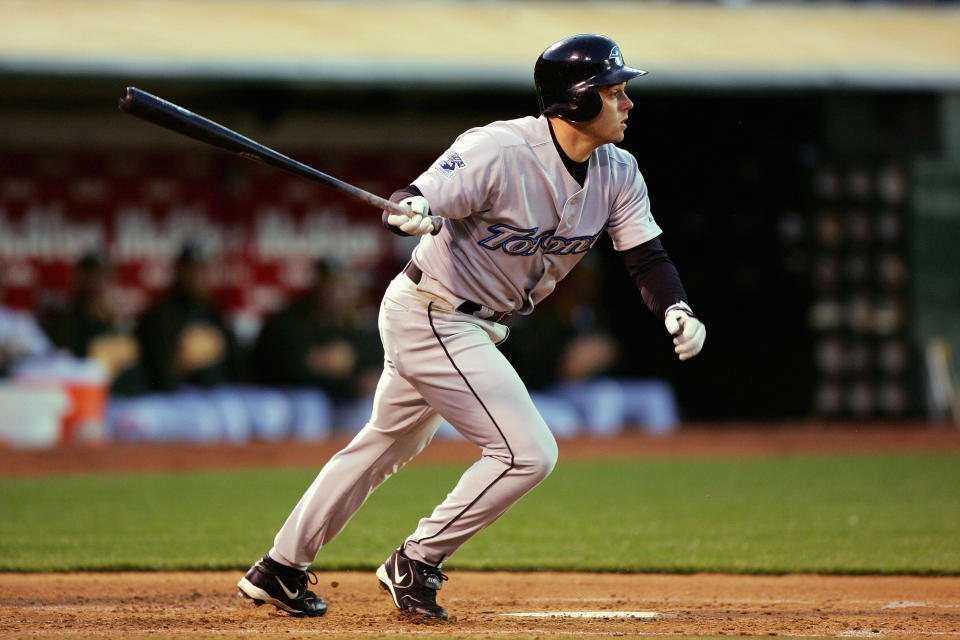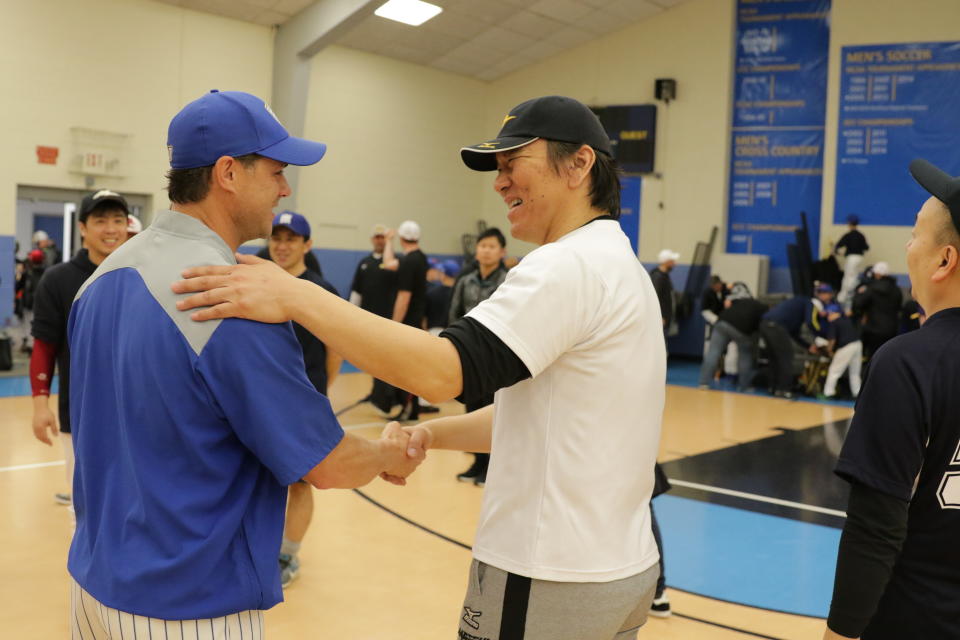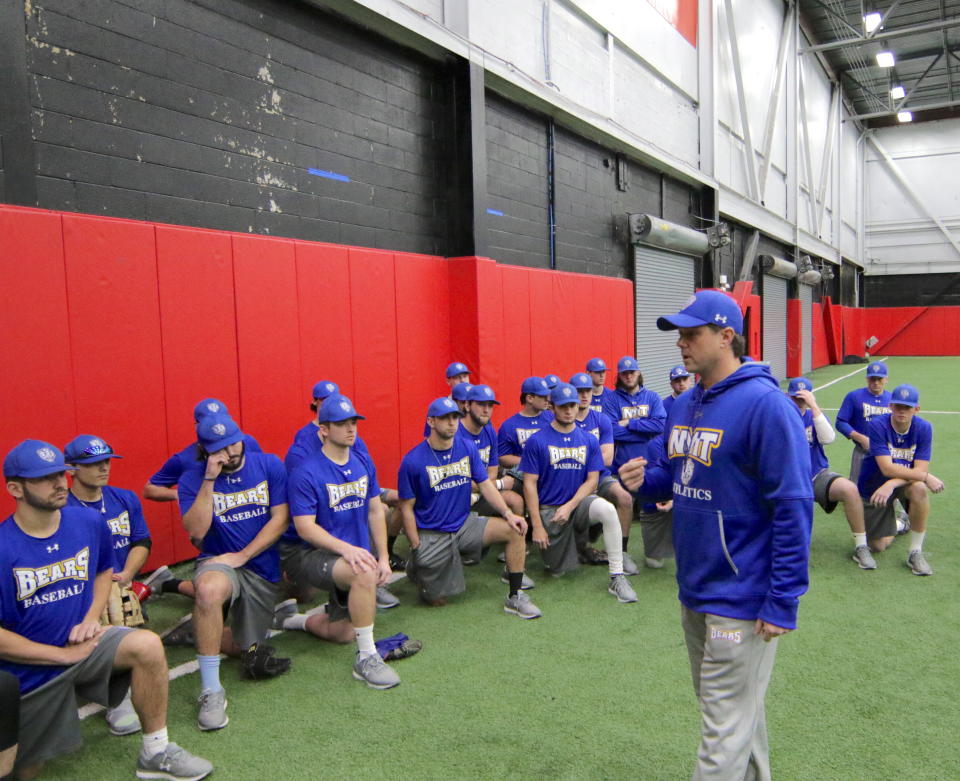How a retired major leaguer and ex-ESPN reporter transformed a DII baseball program

OLD WESTBURY, N.Y. — The Frank Catalanotto era of NYIT baseball started with a Twitter DM.
But first we have to go back to 2010. Catalanotto, who was drafted out of Smithtown High School on Long Island and played 14 years in the majors, spent the last few months of his career with his hometown New York Mets. There, he met ESPN beat reporter Adam Rubin and followed him on Twitter. By the All-Star break, Catalanotto was out of baseball, retiring with a .291/.357/.445 slash line and $22 million in career earnings. Rubin, meanwhile, was amassing one of the largest followings in sports media with his thorough coverage of Mets minutiae.
It was a relentless job, and after 15 years on the beat, Rubin was already burned out and looking for something else when ESPN declined to renew his contract in 2017. He decided to leave journalism altogether but stay in sports, becoming the assistant athletic director for strategic communications at the New York Institute of Technology, a small school known for its emphasis on applied scientific research.
It’s a fancy title for what is in fact a one-man media and media relations department. Rubin is the school’s SID, but he also runs the HDMI cables to the center field camera before each baseball game, and takes photos of the graduating members of the team and their family for Senior Day, and writes recaps for each game, and profiles for each player, and does this all for 17 sports.
He’s almost as busy as he was as a beat reporter, except now when the women’s basketball team goes to the NCAA tournament, “you played a small role in that,” Rubin said. Finally, his objectivity was compromised and he was able to be a fan again.
Never an athletic powerhouse, the NYIT men’s baseball team did use to be Division I, and they used to be pretty good, too. For nearly 20 years in the ‘70s and ‘80s, the Bears finished every season with a winning record and saw a handful of players drafted or signed by major-league franchises. But that was a long time ago. After 11-straight losing seasons starting in 2007 (including going 4-46 in 2014) the Bears dropped to DII. It didn’t change much. Last year, the team went 13-25-1, and when the head coaching job opened up at the end of the year, Rubin decided there was nothing to lose by asking a former major leaguer he had once known for a couple of months to take over the team.
So he sent Catalanotto a DM.
“If I remember correctly, it took him a few days to get back to me because I don’t think he’s on [Twitter] every second of every day,” Rubin said. “But he was intrigued enough to have lunch about it.”
“When I first saw the message, I thought to myself, ‘No I’m not I’m not interested,’” said Catalanotto, who hadn’t heard from Rubin in seven or eight years at that point.
He had spent the time since leaving baseball shuttling his four daughters to athletic practices and flipping houses. But his daughters were in school most of the day and real estate transactions didn’t satiate his need for competition.
“I mean everyone thinks, ‘Oh, you’re 36 years old and you’re retired, you’re so lucky.’ And I was, don’t get me wrong. But there was something missing.”

So Catalanotto took the lunch. He reached out to Jimmy Goelz, an NYIT alum who spent seven seasons in the minor leagues, to ask if he would want to come onboard as an assistant coach. Goelz was a go; the idea picked up some steam. Catalanotto started to think that maybe this was exactly what was missing. He was a little bored; he wasn’t bitter toward the game. He had rejected offers to coach at the pro level because he didn’t want to be back on the road, away from his family. But NYIT offered him the chance to stay close to home and still return to the diamond.
Now he just had to impress the players. As part of the selection process, the NYIT athletic department asked a coalition of five upperclassmen on the team to interview the coaching candidates.
“We asked him a bunch of questions like, ‘We have to drive vans to games, are you comfortable driving a van?’” said Jake Lebel, a towering 6-foot-5 first baseman with floppy hair. Catalanotto can drive a van, but to be honest, it never really mattered. The point was he’d played in the bigs — better still, he had been on the Texas Rangers in the early aughts.
“All these guys are Yankee fans, so they were licking their chops like ‘A-Rod, A-Rod,’” Lebel says. And Catalanotto has been happy to oblige, telling stories about his former teammate and perks of an MLB charter plane, but that’s not what stood out to Lebel.
“He told us in the interview, he didn’t even know the team yet, but he said with the staff he was bringing in we could win ballgames right away. And that’s what we wanted to do. We had done enough losing here. Especially the senior class, we’d been through some long seasons. And he told us we’d win right away.”
***
What surprised Catalanotto the most is how little the team knew about baseball. He had never played in college, and it had been decades since the fundamentals became second nature. But watching the Bears last fall, he saw the sort of mistakes that get pounded out of guys in pro ball -- like when players flailed at the first pitch after the opposing pitcher walked three straight batters.
“I quickly realized that you have to tell these guys everything,” he said.
But the talent was there, the willingness to learn, and a newfound faith in the program. Coach Cat taught the kids to hit the ball the other way, to eliminate parts of the plate and look for your pitch. He explained to them exactly what to look for from the dugout so you’re ready when it’s your turn to bat, which he remembered Larry Parrish showing him years ago as a minor leaguer. Rubin got David Wright and Hideki Matsui to come in as guest instructors. Almost overnight, they instituted a winning culture where losing had become the norm.
“Winning is amazing,” Lebel said. “I mean I’ve done the losing and I was sick of it. I was near feeling like I was done with baseball. And then once we found out he was coming in, and, him saying that we were going to win right away, it changed the mood right away.”
In short: it worked.

The Bears went 32-14 this year. They were eliminated early from the Eastern Coast Conference tourney (along the way Catalanotto picked up his first ejection as a college coach) but also earned their first NCAA tournament berth since 1983. It’s been over a decade since anyone was drafted out of NYIT, but recently some scouts came out to look at a couple of players, including Ben McNeill, a junior who batted .324 at shortstop this season.
“Taking some of his 14-year major-league hitting mentality and putting it in a Division II college game, makes a lot of difference,” McNeill said. “Before every at bat, every hitter turns to him, ‘Hey, Coach Catalanotto, what should I be looking for?’ It gives us that little mental edge before we step in the box.”
It’s also attracted the attention of talent around the country — DI kids interested in transferring to NYIT and high schoolers on the cusp who would rather get substantial playing time for Coach Cat than ride the bench at a bigger program.
Winning is important to Catalanotto. He wants to make the Bears’ program a baseball destination; he wants to get his players scouted and maybe even drafted; he wants to win a College World Series. At some point, when his girls have all graduated high school and are away at colleges of their own, he wants to at least consider coaching in the pros.
Those are the goals; that’s what would validate what Catalanotto and his assistant coaches are doing out at NYIT. But that doesn’t explain why a man who was able to comfortably retire at 36 went back to work standing in the cold rain reminding kids who probably won’t go pro to stop trying to pull the ball.
That’s just about the baseball.
“Those butterflies that I hadn’t gotten [in] a long time that I used to get before every game,” Catalanotto said. “I still get those here. It kind of feels like this is what I needed, and I just love it.”

More from Yahoo Sports:


